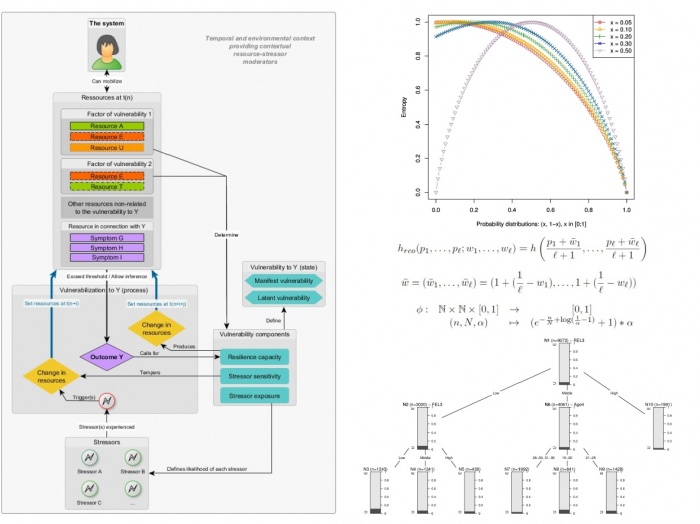Soutenance de thèse Emmanuel Rousseaux
M. Emmanuel Rousseaux soutiendra, en vue de l'obtention du grade de docteur ès sciences de la société, mention systèmes d'information, sa thèse intitulée:
Modelisation and Information System Tools to Support the Discovery of Interactive Factors of Vulnerabilities in Life Courses
Date: Mercredi 12 décembre 2018 à 15h15
Lieu: CIGEV - salle 126-128 1er étage - Boulevard du Pont-d'Arve 28 - 1205 Genève
Jury de thèse:
- Prof. Giovanna DI MARZO SERUGENDO, co-directrice de thèse
- Prof. Gilbert RITSCHARD, co-directeur de thèse
- Prof. Michel ORIS, président du jury
- Prof. Boris WERNLI, Université de Lausanne
- Prof. Djamel ZIGHED, Université de Lyon 2, France
Résumé:
The present Ph.D. thesis in information systems provides social science research with a conceptual model and the associated analytic tools to support the discovery of interactive factors of vulnerability in life courses. The past decades have seen several social changes emerge that place individuals at risk of experiencing undesired situations such as social exclusion, poverty, or stress. To study how such risks spread across people lives, the life course perspective and the vulnerability framework have recently grown in popularity. The first research question addresses the issue of integrating both frameworks of life course and vulnerability together to put forward, under some simplifying assumptions, a conceptual model of the process of vulnerability to a life course outcome. Such a model is primarily expected to clarify the practical meanings of studying vulnerability and therefore would serve as a basis and a shared vocabulary for researchers in information systems interested in proposing strategies to address the vulnerability in life courses. In addition, an effective strategy to overcome social vulnerability is to set up social policies targeting vulnerable people. To this purpose, a preliminary step is to understand what are the factors in connection with vulnerability outcomes. The second research question addresses the issue of identifying the underlying interactive factors of vulnerability using classification tree methods. As I postulate that, in modern societies, vulnerability outcomes are usually infrequent compared to desired life situations, I focus on identifying interaction effects in the context of class imbalance.
I answer the first research question by providing a conceptual model of the diffusion of the vulnerability to a life course outcome as a dynamic process. I assess this model by confronting it with the other frameworks and models of vulnerability in life courses reviewed. Results show that the proposed model covers to a large extent the other approaches. I answer the second research question by providing two complementary methodologies for exploring the attribute space and identifying underlying interaction effects with imbalanced data. The first methodology focuses on the exploratory process while the second methodology focuses on the tree growing process. The first methodology consists of the use of a preliminary bivariate analyses step to separate between strong and weak associations with the outcome variable and then to explore those associations by dynamically tuning the classification tree growing parameters through an interactive graphical interface. The second methodology consists of better separating between vulnerability outcomes in an imbalanced data context. To do so, I put forward three classification tree growing measures designed for this purpose. I assess the first methodology by conducting an exploration of underlying factors of vulnerability on real data. The study focuses on the vulnerability to poverty in targeting underlying factors of unemployment among young adults second-generation immigrants in Switzerland. The methods successfully achieve to extract an underlying factor of vulnerability to poverty related to the individual and the father educational resources. This result has been published in Guarin and Rousseaux (2017). I assess the second methodology by comparing the performance of the proposed tree growing measures to several data imbalanced strategies discussed in the literature review. The results tend to indicate that the contributions are able to achieve similar performances than the other strategies but in building less deeper trees. Such a feature matters to social scientists that are interested in result interpretability.
December 10, 2018

News
